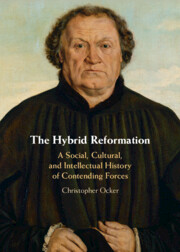Book contents
- The Hybrid Reformation
- The Hybrid Reformation
- Copyright page
- Additional material
- Dedication
- Contents
- Preface
- Part I Indifference and Ambiguity
- Part II Medieval Protestants
- 4 A Reformation Stake in Medieval Thinking
- 5 The Trouble with Ockham
- 6 Wegestreit
- Part III Interpretation beyond Borders
- Bibliography
- Index
4 - A Reformation Stake in Medieval Thinking
from Part II - Medieval Protestants
Published online by Cambridge University Press: 30 September 2022
- The Hybrid Reformation
- The Hybrid Reformation
- Copyright page
- Additional material
- Dedication
- Contents
- Preface
- Part I Indifference and Ambiguity
- Part II Medieval Protestants
- 4 A Reformation Stake in Medieval Thinking
- 5 The Trouble with Ockham
- 6 Wegestreit
- Part III Interpretation beyond Borders
- Bibliography
- Index
Summary
This chapter examines the decline of an historical idea, namely, that the Reformation marked a rupture in the intellectual and cultural history of Europe. In that idea, the Reformation was supposed to interrupt and begin to dismantle medieval philosophy, theology, science, aesthetics, politics, and even popular mentalities. Since the publication of Heiko Oberman’s Harvest of Medieval Theology (1963), many historians have abandoned the idea that the Reformation marked a radical, modernizing break from medieval thought and culture.Instead, scholars see the Reformation as a series of incremental changes taking place over a long period of time, roughly between 1450 and 1650. The chapter explains the constructive role of medieval theology in Protestant thought on the example of Matthias Flacius Illyricus, and it summarizes and interprets recent scholarship on the late medieval background to Reformation thought.
Keywords
- Type
- Chapter
- Information
- The Hybrid ReformationA Social, Cultural, and Intellectual History of Contending Forces, pp. 67 - 99Publisher: Cambridge University PressPrint publication year: 2022

